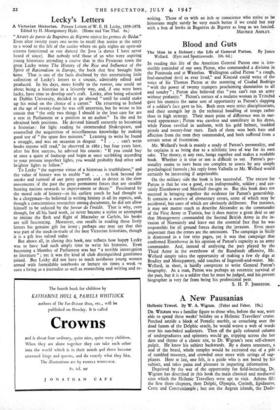Blood and Guts
IN reading this life of the American General Patton one is irre- sistibly reminded of our own Picton, who commanded a division in the Peninsula and at Waterloo, Wellington called Picton " a rough, foul-mouthed devil as ever lived," and Kincaid could write of the voice of Sir Thomas Picton at the storming of Ciudad Rodrigo " with the power of twenty trumpets proclaiming damnation to all and sundry " ; Patton also believed that " you can't run an army without profanity." Picton's torture of a mulatto woman in Trinidad gave his enemies the same sort of opportunity as Patton's slapping of a soldier's face gave to his. Both men were strict disciplinarians, and their strength lay in the technical handling of troops rather than in high strategy. Their main point of difference was in out- ward appearance ; Picton was careless and unmilitary in his dress, while Patton revelled in uniform, with his gold helmet, 'studded pistols and twenty-four stars. Each of them won both hate and affection from the men they commanded, and both suffered from a certain sense of frustration.
Mr. Wellard's book is mainly a study of Patton's personality, and he explains it as being due to a nihilistic love of war for its own sake. The theory, at any rate, hangs together and makes a readable book. Whether it is true or not is difficult to say. Patton's per- sonality seems to have been too complex to assess by any simple psychological formula ; his reply from Valhalla to Mr. Wellard would certainly be interesting if unprintable.
On the military side the book is less successful. The excuse for Patton is that he was a good, even indispensable, soldier ; and cer- tainly Eisenhower and Marshall thought so. But this book does not succeed in bringing together the evidence for Patton's generalship. It contains a number of elementary errors, some of which may be accidental, but some of which are obviously deliberate. For instance, it may not matter much to describe Alexander as the commander of the First Army in Tunisia, but it does matter a great deal to say that Montgomery commanded the Second British Army in the in- vasion of Normandy and leave out the essential fact that he was responsible for all ground forces during the invasion. Even more important than the errors are the omissions. The campaign in Sicily is dismissed in a few trite pages, yet it was that campaign that confirmed Eisenhower in his opinion of Patton's capacity as an army commander. And, instead of analysing the part played by the Third Army in the overthrow of the Rundstedt offensive, Mr. Wellard simply takes the opportunity of making a few sly digs at Bradley and Montgomery, odd touches of Ingersoll-and-water. Mr. Wellard, in short, is hardly competent to write General Patton's biography. As a man, Patton was perhaps an eccentric survival of the past, but it is as a soldier that he must be judged, and his present biographer is very far from being his professional peer.
S. H. F. JofiNsToN.






































 Previous page
Previous page